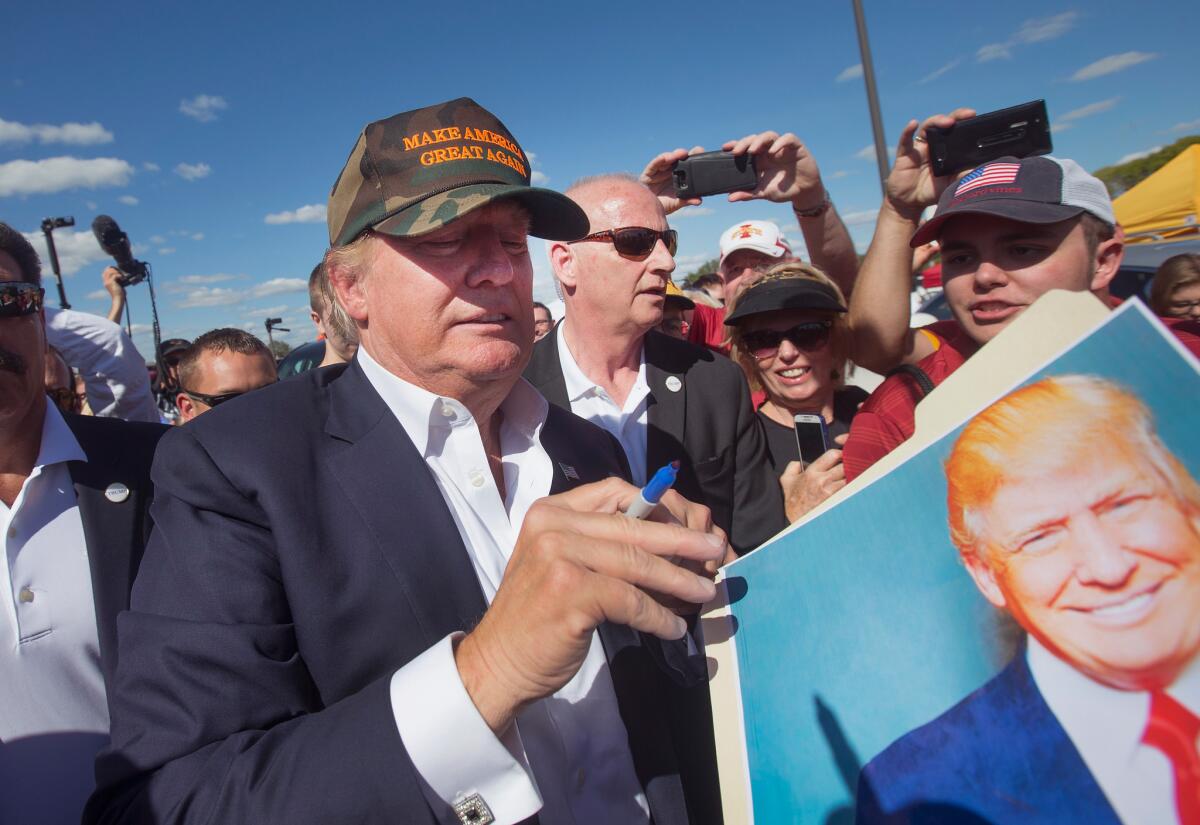Analysis: Republicans condemn Trump but won’t rule out backing him if he becomes the nominee

Republican presidential candidate Donald Trump campaigns in Iowa in September.
- Share via
Donald Trump may be an imperfect candidate — he is coarse, impetuous, antagonistic — but he presents the Republican Party with a perfect dilemma.
For the second straight day, the world of politics was consumed with Trump’s latest provocation, a call for a near-blanket ban on Muslims entering the United States, underscoring the billionaire’s continued sway over his adopted party, its presidential candidates and the GOP agenda.
Many Republicans were quick to denounce the proposal but not its progenitor, fearing a backlash should Trump become the party’s eventual nominee. He is, after all, the leader in opinion polls and a favorite of many voters disgusted with more guarded, standard-issue politicians.
“This is not conservatism. What was proposed yesterday … is not what this party stands for,” House Speaker Paul D. Ryan (R-Wis.) told reporters Tuesday after a meeting with GOP House members on Capitol Hill. “And more importantly, it’s not what this country stands for.”
As a conservative who truly cares about religious liberty, Donald Trump’s bad idea and rhetoric send a shiver down my spine.
— Matt Moore, chairman of the South Carolina Republican Party, on Twitter
Other members of the Republican establishment weighed in with criticism as well, including party leaders in three of the earliest-voting states, South Carolina, New Hampshire and Iowa.
“As a conservative who truly cares about religious liberty, Donald Trump’s bad idea and rhetoric send a shiver down my spine,” Matt Moore, head of the South Carolina Republican Party, wrote on Twitter.
Jennifer Horn, leader of the New Hampshire GOP, called Trump’s proposal “un-American” and “un-Republican.”
But the condemnations went only so far, as Ryan, Senate leader Mitch McConnell (R-Ky.) and other Republicans vowed to support Trump, whatever their qualms, should he emerge as the GOP’s standard-bearer.
Even Jeb Bush, who called Trump “unhinged” for proposing a religious test on newcomers as a way to fight terrorism, declined to back off an earlier pledge of support.
“Look, he’s not going to be the nominee,” the former Florida governor insisted when pressed by reporters at a campaign stop in New Hampshire.
What, then, was his message to Trump supporters? “I’d love for them to consider my candidacy,” Bush replied.
The exchange captured the quandary that the GOP and its presidential hopefuls have faced ever since Trump bulldozed his way into the race: How to distance themselves from his inflammatory statements without alienating Trump supporters, or provoking him into a ruinous third-party run should he fall short of the nomination.
“A new poll indicates that 68% of my supporters would vote for me if I departed the GOP & ran as an independent,” Trump posted on Twitter, citing a Suffolk University poll, as Tuesday’s chorus of Republican criticism grew.
The message, in characteristic Trump fashion, was as subtle as a kick in the shins.
Unabashed, he seized on the furor he created — and the wall-to-wall cable news coverage that followed — to defend his exclusionary plan and brush aside detractors.
“You’re going to have many more World Trade Centers if you don’t solve it. Many, many more and probably beyond the World Trade Center,” Trump said in a CNN interview, referring to the Sept. 11, 2001, terrorist attacks.
On MSNBC, he said barring followers of the Islamic faith from the U.S. would be as easy as authorities asking people at entry points about their religious affiliations. “They would say, ‘Are you Muslim?’” Trump explained.
He cited the precedent set during World War II when the U.S. government investigated people of German and Italian ancestry, and ordered those of Japanese descent to be locked away in internment camps.
“You certainly aren’t proposing internment camps?” asked host Joe Scarborough.
“We’re not talking about Japanese internment camps,” Trump responded. “No, not at all.”
Such distinctions aside, Democrats happily piled on the Republican front-runner and his extraordinary response to the terrorist attacks on Paris and San Bernardino, in contrast to President Obama’s call to avoid targeting all members of the Muslim faith.
White House Press Secretary Josh Earnest called Trump’s comments “morally reprehensible” and “counter to the Constitution.”
“The bigger problem, in my mind, is the way the rest of the Republican Party is not acting to make clear that they would never support him for president of the United States,” Earnest told reporters at his daily briefing.
Trump’s emergence comes at a crucial time for the GOP, which has lost the popular vote in five of the last six presidential elections.
The party’s political base of older whites is aging out of the electorate and Republicans have struggled to appeal to the growing ranks of younger and minority voters, a task that grows more difficult each time Trump gives offense to one ethnic or religious group or another.
“While entertaining for some, I and many worry about the long-term damage [among] younger voters, African American voters, Hispanic voters, working-class voters,” said Scott Reed, a longtime Republican strategist and political advisor to the U.S. Chamber of Commerce. “He’s managing to alienate a little bit of everybody.”
Reed, whose focus is congressional contests, expressed concern that Trump atop the presidential ticket could undermine Republican senators facing tough races in Nevada, Ohio and New Hampshire, which could determine control of the Senate after 2016.
He is not alone.
In a private memo recently quoted in the Washington Post, the head of the National Republican Senatorial Committee outlined a number of strategies for candidates to follow in the event Trump — “a misguided missile” — wins the party’s nomination.
“Let’s face facts,” Ward Baker, the head of the committee, wrote to his senior staff. “Trump says what’s on his mind, and that’s a problem. Our candidates will have to spend full time defending him if that continues. And that’s a place we never, ever want to be.”
His counsel included urging candidates to mind their campaigns and avoid attacks on Trump, lest they backfire on the GOP.
Not all, however, were given to such restraint.
South Carolina Sen. Lindsey Graham, a Republican presidential hopeful who has frequently tangled with the party’s front-runner, offered his succinct view in an interview on CNN.
“You know how you make America great again?” Graham said, appropriating his rival’s signature campaign slogan. “Tell Donald Trump to go to hell.”
Twitter: @markzbarabak
Times staff writers Lisa Mascaro, Seema Mehta and Christi Parsons contributed to this report.
More to Read
Get the L.A. Times Politics newsletter
Deeply reported insights into legislation, politics and policy from Sacramento, Washington and beyond. In your inbox twice per week.
You may occasionally receive promotional content from the Los Angeles Times.











